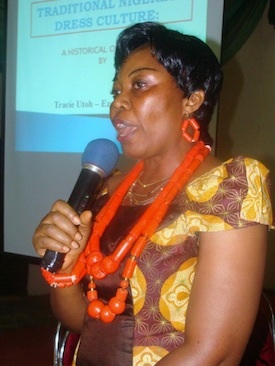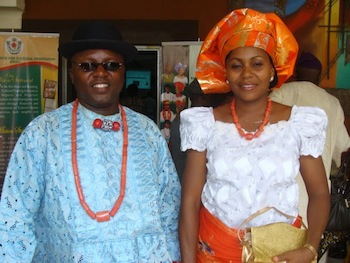Nigeria's image in Western media is a complex combination of exoticism, intrigue and danger. While most people are well acquainted with Nollywood (now the second largest film industry after India's Bollywood), we are often simultaneously inundated with images of another Nigeria that has nothing to do with entertainment. With the militant groups battling around the conflicted oil-rich Niger Delta, the ongoing violence between the Muslim and Christian communities, rampant political corruption in sectors of leadership, and various human rights violations including judicial corruption and inhumane treatment of prisoners, it is easy for a foreign observer to primarily view Nigeria as a country of political instability and even questionable safety. Add in former President Umaru Yar'Adua's mysteriously prolonged absence from his duties before his untimely death plus the recent attempted detonation of a transatlantic flight by a young Muslim Nigerian citizen last December, and we officially have a very provocative portrait of Nigeria that is being carefully analyzed by not only Westerners, but also Nigerians themselves.
Nigeria, despite this tumultuous media identity, has ambitious plans as the most populous state in Africa. The Nigerian government is currently working on procuring a spot in the top 20 economies of the world by 2020. The new leader, President Goodluck Jonathan, hopes to pick up where Yar'Adua left off and implement policies that clean out the political corruption that his predecessor was too ill to complete. Meanwhile on the soft power front, Nigeria is actively looking towards their rich indigenous culture in order to promote facets of their society that are given much, much less media attention.
Over the past few weeks I've spoken with Dr. Barclays Ayakoroma, the Executive Secretary of the National Institute for Cultural Orientation (NICO) in Abuja, regarding Nigeria's cultural diplomacy efforts. Established in 1993 as a joint initiative between the Nigerian government and UNESCO during the World Decade for Cultural Development, NICO is responsible for researching integral assets of Nigerian culture in order to utilize those values to complement the nation's various developmental programs. Dr. Ayakoroma revealed to me a fascinating yet subtle approach that NICO is undertaking in order to first build a firm foundation for cultural diplomacy: cultural reorientation.
Nigeria, like much of the planet, has had a dramatic decade in terms of globalization. Politics and economics aside, indigenous Nigerian culture has been influenced--and in some cases altered--by Western style preferences and signifiers. Though cultural amalgamation is often beneficial and auspicious for human progress in general, the issue remains if our collective innovations should ever replace important elements of cultural history and tradition.

This leads me to NICO's recent national workshop titled, "Promoting Nigerian Dress Culture." The objective of the workshop was simple: to provide a public reorientation with the traditional dress of Nigeria, particularly because so many adults and children are opting to entirely replace their former wardrobes with typical Western gear such as t-shirts, denim, tank tops, shorts, etc. The workshop held a panel discussion with presentations by local scholars, a fashion show and multiple art exhibitions on traditional Nigerian dress culture.

There are multiple cultural perspectives to consider within this situation. What is considered to be "indecent" dressing is an issue in Dr. Ayakoroma's view, however deviated from our social norms as this may sound. When I asked him if the matter included showing too much skin (on the basis that his interpretations of fashion and gender roles may be inherently divergent from my own), he elaborated how this could be misconstrued since "traditional dresses, worn in many parts of the country that could permit [showing skin], of course, depends on the occasion. Young Fulani girls wear the kind of dress that have slits at the sides and expose the navel. People are used to it. What we are actually concerned about is everyday social dresses."
While adopting new styles of clothing is not exactly what I consider to be the most offensive action towards society, Dr. Ayakoroma discussed how his objective with the national workshop on dress culture is not only a matter of offense or even indecency in and of itself. He explained to me how Nigerian banks used to devote each Friday to wearing traditional African or Nigerian dresses, similar to our corporate world's 'casual Fridays' option. "On those days," he said, "bank workers wore various attires to reflect their cultural background. That was when you would see agbada, babariga, etibo, woko, opu shirti, jumper, shokoto, kente akwete, and so on. Unfortunately, that tradition has been abandoned because bank workers now wear mostly branded t-shirts."
A consequential issue that arises in the backdrop of the cultural discussion surrounding Nigerian dress is the fact that because of the growing abandonment of Nigerian fashion, many of the country's own fashion designers feel financial pressure to create their designs using Western fabrics and templates. This condition has forced Nigerian fashion designers to successfully redefine their styles--a fortunate result of globalization to most people. At the same time however, the country has also become a kind of "dumping ground" for second hand clothes from abroad. Containers of clothes from overseas are permeating the African continent and such items are often unlabeled and from unknown sources, according to Dr. Ayakoroma, who also worries about the hygienic standards of such receivables.
NICO desires an approach to cultural decisions that is cognizant of Nigeria's rich heritage as well as sensitive to the fact that preservation of cultural facets are critical to both Nigeria's history as well as its future diplomacy. Without reorienting and reinvigorating intrinsic cultural practices of the past, Nigeria's outreach through diplomacy may not be optimized to its fullest potential. Dr. Ayakoroma believes that "dressing speaks volumes, and the National Institute for Cultural Orientation is using every opportunity at its disposal to promote that aspect of our cultural life, among other areas." He hopes that by reorienting Nigerian citizens with the basics of their inherent culture the Nigerian people can establish the essential equanimity and gratification in their own context that will hopefully provide fertile grounds for active cultural diplomacy. In our era of radical globalization, this goal clearly requires extraordinary levels of perspective, resilience and sensitivity. Considering the fortitude that Nigerians clearly exude even in times of bitter domestic turmoil, I doubt that the Nigerian people will miss the opportunity for an acceptable cultural balance.